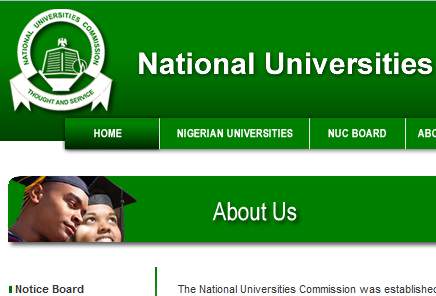Abuja – Prof. Julius OKojie, the Executive Secretary, National Universities Commission (NUC), has raised concern over high tuition fees charged by private universities.
Okojie expressed this concern on Thursday in Abuja at the presentation of full Operational Licences to nine private universities earlier granted provisional licences in 2007, 2009 and 2011.
11 other private universities that got provisional licences the same period were given two-year extension to meet the full accreditation requirements.
Okojie, however, said that the issue of tuition in private universities depended on the market demand, quality and facilities therein.
“Some private universities charge up to N1 million but it is a market of demand and supply situation; if fees scare students away, it affects the institution.
“If you go to American University, Yola, not only do they provide computers and some other extra things, they take students on tours; there are additional costs not just for the teaching alone.
“It depends on where you want your child to go to. If a private university does not have a good programme and charges high fees, nobody will come; it is a market demand situation.
“We also advise them not to charge astronomical fees, but some grant waivers to indigent students and offer scholarships.’’
He posited that granting full licences to recipients was informed by their performance and growth within the guidelines stipulated by the commission.Okojie warned that NUC would not tolerate any breach in the conditions for the issuance of operational licences.
The NUC boss listed some of the conditions that an institution must meet before being considered for full licence.
“After three years, we go for accreditation on staff quality and distribution.
“If all the staff members are grade one lecturers, they will not make it; some should be professors; other mid-career and then the bottom.
“Then, governance structure, do they have a council that is running? What is the quality of staff and number and then general environment.
“Are they having crisis? Are they on a permanent structure? what is their relationship with the host environment?, among others.’’
On the 11 private universities that were given two-year extension, Okojie said they had yet to meet the basic criteria.
According to him, they have not done well in their accreditation and they are weak in their programmes.
He said that NUC conducts three types of accreditation — full, interim and denied.
“If you have interim in all your programmes after three years, it means you are not doing well.
“Half of your programmes should be full; if you have two or three denied, we will not give you full licence.
“They have to look at their programmes and staff strength; if it is facilities, let them build; two years is enough,’’ he said.
NAN reports that the nine private universities that got full licences were Caleb University, Lagos, Salem University, Lokoja, Veritas University, Abuja, Afe Babalola University, Ado-Ekiti and Nigerian Turkish Nile University, Abuja.
Others are Godfrey Okoye University, Enugu, Fountain University, Osogbo, Adeleke University, Ede, Osun State and Western Delta University, Oghara, Delta State.
Some of the universities that got two-year extension were Landmark University, Omu-Aran, Kwara State, Rhema University, Aba, Abia; Oduduwa University, Ile-ife and Baze University, Abuja.
Hello Visitors!
Jobs and similar opportunities like this are listed daily on our platforms, and as such, it is important to take due advantage of that.
Here is how:
- Kindly Click here and add your valid email address to get updates directly to your mail. Remember to click on the confirmation link in your mail.
- Next, click here to visit our jobs listing Portal for latest Job positions.
- Alternatively, you can visit here to see top companies recruiting, or check out latest jobs in your state or latest Jobs in your industry of interest.
- Pick your area of interest.
- Read the requirements,
- Next, apply.
- Remember to always share this article with others.
- If website is down, kindly subscribe to our email notification, we will notify you once it is up.

